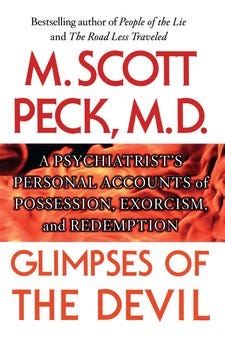Glimpses of not so evil?
For the past six months I’ve been ruminating on the last book written by Scott Peck, the well known author of the Road Less Traveled, called Glimpses of Evil. The find of this book was very serendipitous, because like many I’ve been increasingly aware that much of our world has not just been turned upside down, but evil seems to be rampant in unprecedented ways. A retired psychologist friend recently commented on some recent posts of mine on a forum about psychology being a more recent construct of humanity. She felt it was needed because of complexity, I would say more from an observation of complicatedness and messiness and the priestly caste of scientist decided they could handle it. ( the excellent book, Muses, madmen and Prophets chronicling the clinical history of auditory hallucinations in relation to psychology is a fascinating example of this, even the cited shift between DSM one and two.)
Not withstanding that such “therapies” can be helpful, as Peck saw in Glimpses, but only after other realities were addressed. Another post by my psychologist friend pon Art recently bears witness to something here, how God shows up in the jazz notes of Coltrane is a testimony to that beauty of mystery, but what about the subtle evils, the land of a thousand paper cuts we find ourselves these days…. What was that notification you just got on your phone, tablet or computer.
The old movie Bedazzled made light of evil transactional reality between the consummate play of actors Dudley Moore and Peter Cooke, where the devil was shown to taking socks from peoples dryers to cutting telephone wires… and why this is also evil, in our day we have “personalities” showing up in a myriad of forms moved by not a sacred spirit, but a more malevolent sort. So what is the benefit of seeing the diabolical but yet not demonizing a person or thing you might ask? Because as some of us Christian’s used to say, you see the sin separate from the sinner. That sin is a condition or virus permeating humanity but we are, or at least can, transcend it by a Christ sort of Spirit. The debate may be what this character looks like, is is biblical, theological, rational, or even reasonable? But let’s then define it better by calling it Love.
Love it is said covers a multitude of sins, furthermore we are told in the scriptures that it was laying down of Jesus life (not just in the cross) that He came to reflect to his adherents, and EMPOWER. This too is much a mystery until one gives oneself over to the process of transcendent love, something that is more than a life long endeavor I’ve found. It’s “enemy” indeed is the fragmentation of personality that Peck peered into, as well as I’m sure many a therapist over these years. But it’s also the cowering to lesser forms of love and forgetting to be courageous in the light of differences and contradictions. My point is that glimpses of evil can show up in many well meaning forms and certainly with good intentions as the old adage states about paving the road to hell. In our day it’s probably most reflective in the “hacks” of acting like we care when we don’t, the refusal to show up and say when we have a difficulty, being nice when it’s not constructive… (though we must always try to be kind, we do need to be helped by our friends to do so, especially when we hurt) and many passive way, as well as the obvious. One has only to spend a little time with ultra frail logic of
wokism to see its diabolical frame if one has really developed truer discernment… Now I know such an extreme frame may seem not constructive, but surely if we consider the nature of evil it not just it’s obvious ways but it’s passive and reductionist forms that are the more destructive because they chip away at our very souls.
I’ll conclude with a very staunch but fun British evangelist from the mid part of the last century who I got the to meet near the end of his life, Major Ian Thomas. He said, “ when St. Paul was exhorting Timothy in his letter, he said in evil times that people would stray from truth and run after certain indulgence to satisfy their need for security, but you teach to discern between good and evil. To which he was not talking about obvious good and obvious evil, but yet the evil in what is commonly being called good, and good what is commonly being called evil”


